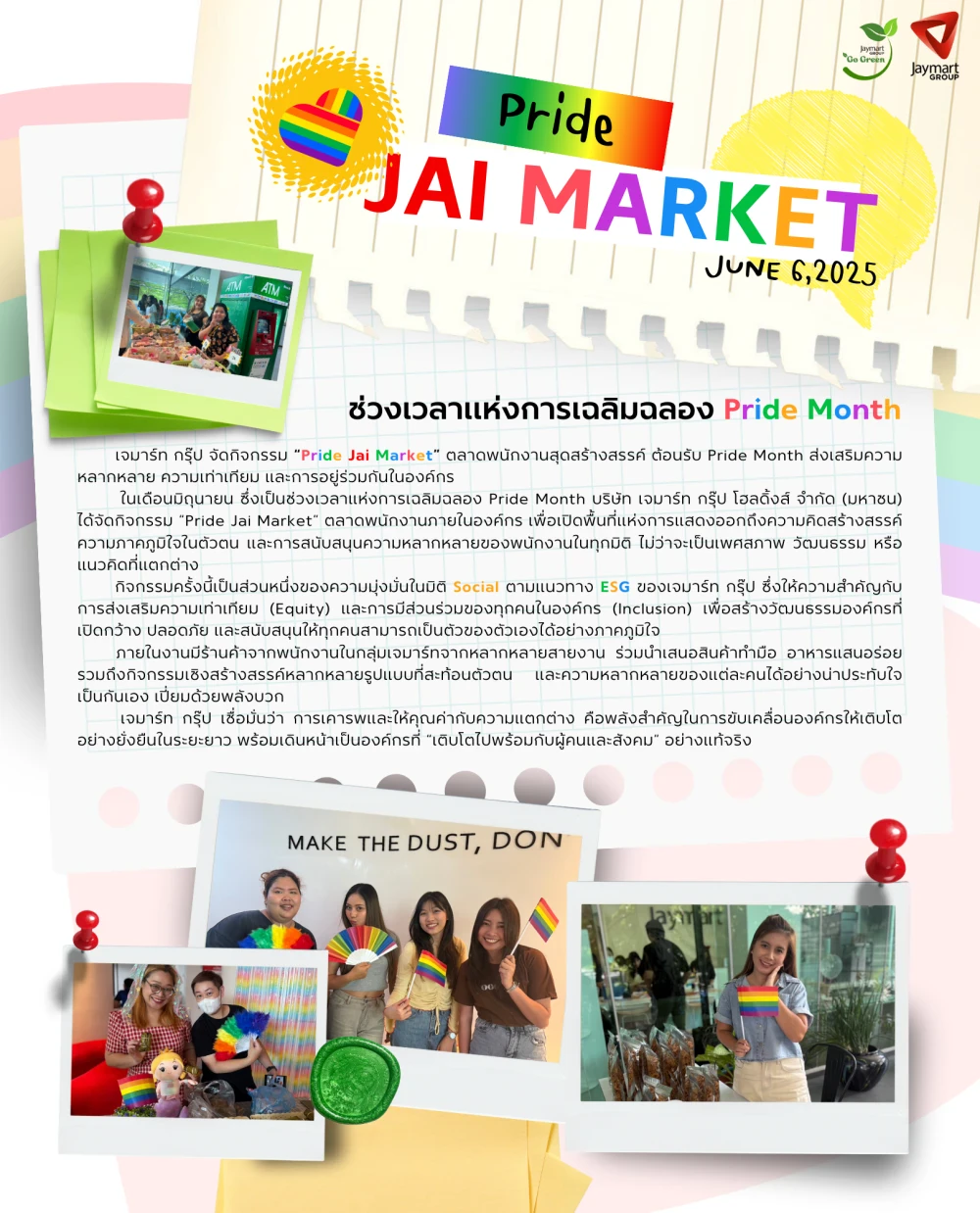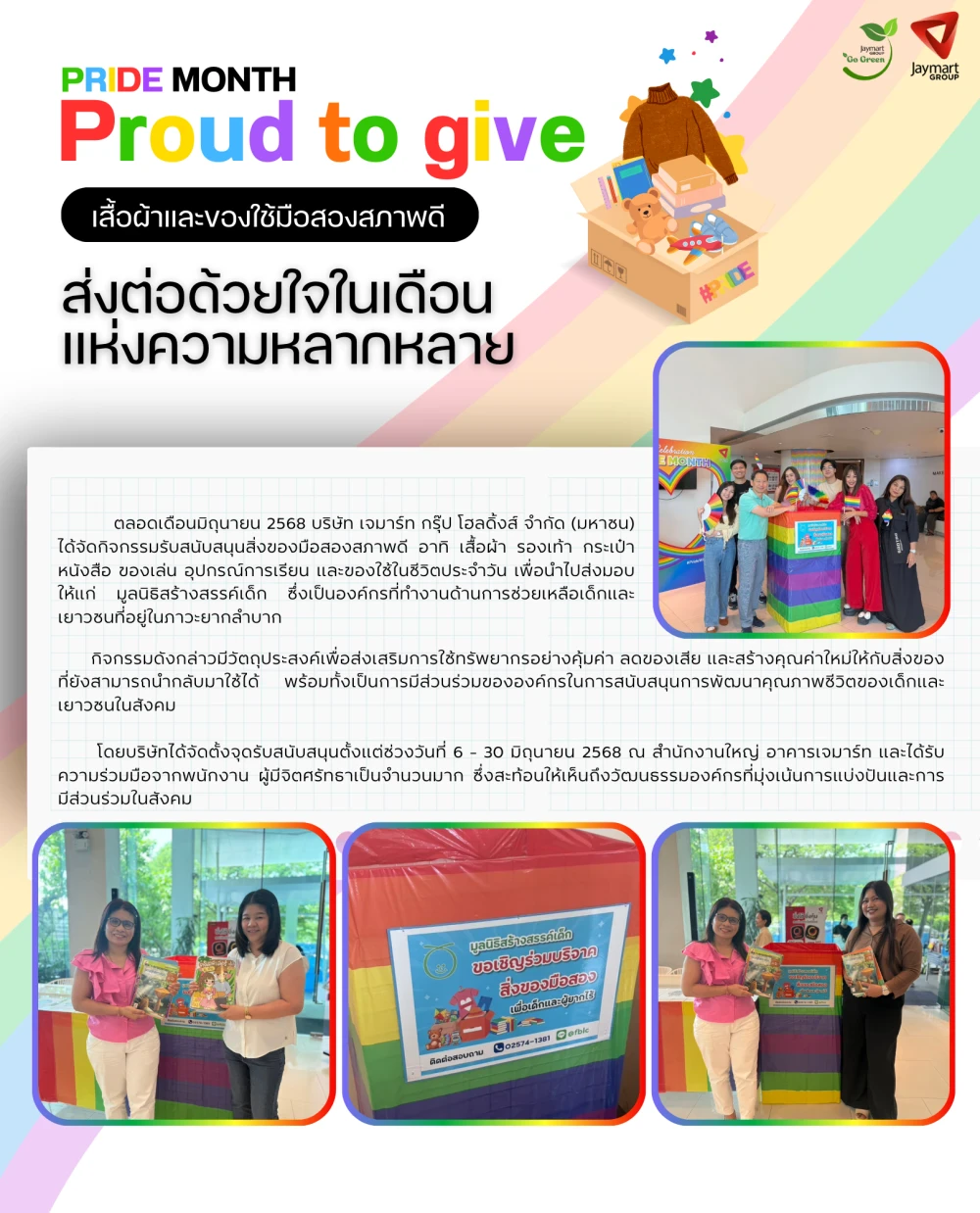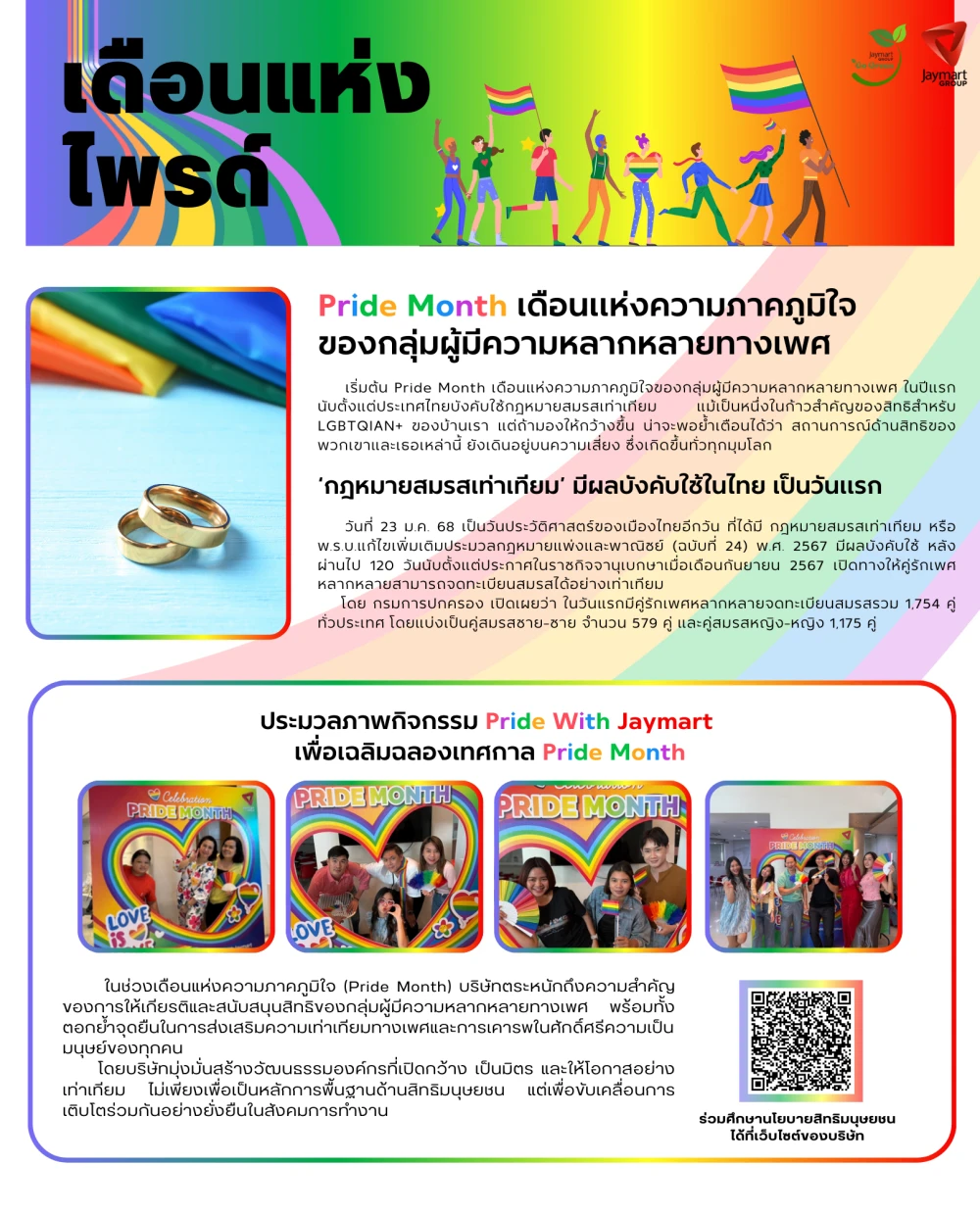Human Rights

Our Commitment
Human rights are fundamental rights inherent to all individuals from birth, and everyone deserves to have these rights protected and respected.
These rights include the right to life, security, personal freedom, and equality. However, human rights violations continue to be a significant issue in many regions worldwide, affecting both the individuals directly impacted and the reputation of the organizations involved, which may lead to complaints and protests from affected entities or individuals.
JMT Group Holdings Public Company Limited and its subsidiaries recognize the importance of respecting human rights in all dimensions, focusing on employees at all levels, as well as stakeholders in the value chain, such as customers, partners, and surrounding communities. The company is committed to conducting business with transparency, ethics, and treating everyone equally without discrimination, while fostering a corporate culture that embraces diversity and accepts differences, ensuring fairness and equality at all levels.
At the same time, the company is dedicated to developing human rights policies in line with international standards and raising awareness among employees to ensure that business operations align with human rights principles. Additionally, the company acknowledges that the development of society and communities is a fundamental foundation for sustainability, and therefore engages in activities aimed at creating positive impacts on communities and the environment.
Supporting The SDGs Goal
Advancing global sustainability through alignment with the UN SDGs.
Stakeholders Directly Impacted
Goals
- There must be no significant complaints and incidents of human rights violations raised by stakeholders affected by the company’s business operations.
Performance Highlights
In 2024 and the preceding years, the company has had
Impact and Performance Highlights
Under the operational framework of Jaymart Group Holdings Public Company Limited, the company is committed to promoting awareness and understanding of human rights among employees at all levels. To achieve this, we actively communicate fundamental human rights knowledge to ensure that employees are well-informed, conscious, and mindful of various human rights issues. These include harassment, discrimination, diversity, and inclusion, among others.
The company utilizes multiple communication channels to effectively disseminate this knowledge, such as email, newsletters, the company website, and other internal platforms. By providing accessible and continuous updates, we ensure that employees receive accurate and relevant information, enabling them to apply this knowledge to their daily work while fostering a respectful and inclusive workplace culture.
Through these efforts, Jaymart aims to create a work environment where all employees understand their rights and responsibilities, treat each other with fairness and respect, and contribute to the company’s commitment to ethical business practices and social responsibility. This initiative not only strengthens internal corporate values but also supports sustainable business growth by embedding human rights principles into our organizational culture.
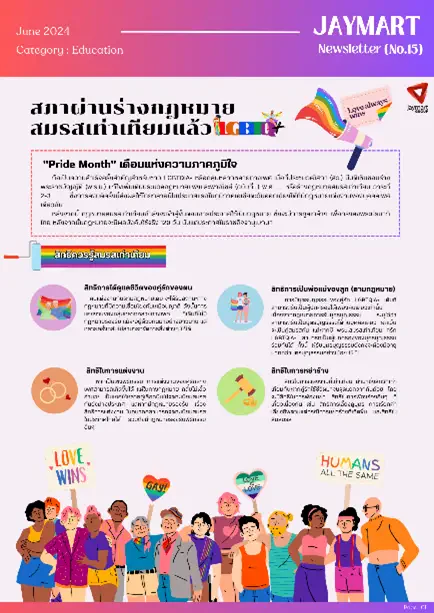
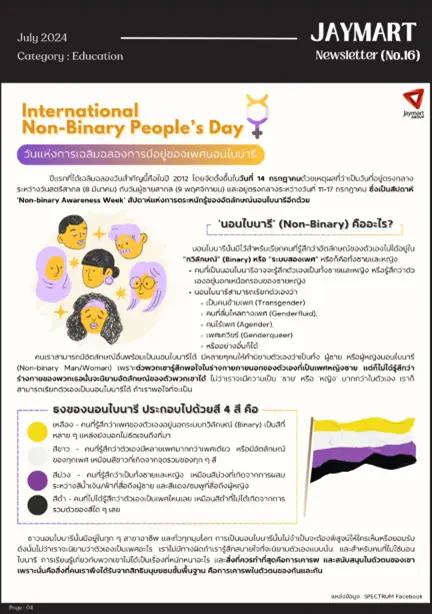
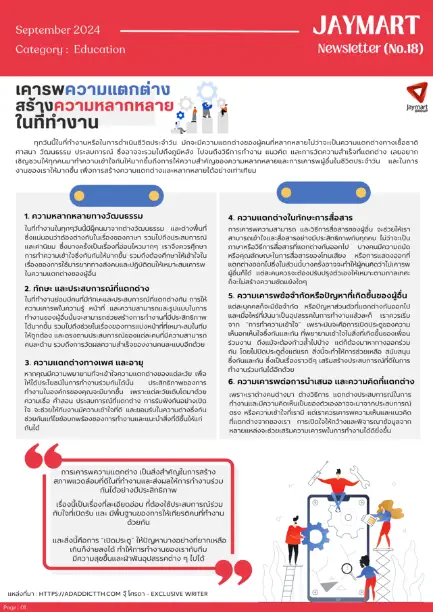
Management Approach
Declaration of Human Rights Policy
Jaymart Group Holdings Public Company Limited plays a key role in establishing the human rights policy for the Jaymart Group of companies, in compliance with human rights laws, local regulations, and international standards. The scope of Jaymart human rights policy covers all stakeholders, including all employees in the company's operations, subsidiaries, affiliates, business representatives, and partners. This includes the Board of Directors, management, and employees at all levels, and is intended as a guideline for strict adherence to honest, ethical, and good corporate governance principles in all business practices.
The company is committed to social responsibility and to all stakeholders in line with the principles of good corporate governance and sustainable business practices. This ensures that the company’s operations align with human rights principles and the United Nations Guiding Principles on Business and Human Rights (UNGP).
The policy addresses key issues such as the humane treatment of employees, free from abuse, violence, sexual harassment, physical or mental threats, or verbal harassment. It also ensures the maintenance of health and safety standards and provides a good working environment. The human rights policy prohibits the company or its employees from engaging in any form of human rights violations or mistreatment, including illegal migrant labor, child labor, etc.
If any individual or employee witnesses actions that violate this policy, they are encouraged to report the misconduct through the whistleblowing or complaints channel provided by the company. The company ensures confidentiality and protects the safety of whistleblowers. If an investigation confirms a violation, the company will take appropriate action in a fair, transparent, and impartial manner, including compensating the victim with fair and reasonable remedies.
Human Rights Due Diligence : HRDD
Jaymart Group Holdings Public Company Limited has continuously intensified its efforts from the formulation of its human rights policy, focusing on good practices with respect to employees and stakeholders. The company has now expanded its focus to include human rights due diligence, guided by the UN Guiding Principles on Business and Human Rights (UNGP), as a framework to ensure that the company adheres to international human rights standards. This process aims to prevent and mitigate potential human rights impacts across the entire value chain, ensuring that any incidents and impacted parties are properly examined.
Scope of Comprehensive Human Rights Management Process:
-
1Establishment of a human rights policy
-
2Identification of issues and assessment of potential impacts from the company’s activities
-
3Preventive measures and mitigation of potential negative impacts
-
4Monitoring, tracking, and reviewing the issues
-
5Communication with stakeholders and the public
-
6Remediation and remedy
Therefore, the comprehensive human rights due diligence framework can serve as a tool to identify issues that might impact the scope of the company’s operations, potentially causing negative impacts on stakeholders in the future. It also identifies issues that could affect the company’s key partners, serving as a tool to manage the organization’s human rights efforts. This process helps discover areas the company still needs to develop or improve or areas where risks exist, and actions may not have been adequately or fully implemented.
When the company identifies an issue that could negatively impact any group of stakeholders, it will establish preventive measures to minimize or eliminate the impact, ensuring that similar situations do not recur. Additionally, the company will establish a framework for remedying the situation for those affected by the company’s activities, guiding the relevant departments in their actions.
Step 1 : Set a Human Rights Policy
The company recognizes the importance of respecting human rights and is committed to adhering to relevant principles and guidelines to ensure that all stakeholders, including customers, partners, employees, and individuals involved in every sector, are treated fairly. Consequently, the company has developed and officially implemented a Human Rights Policy, along with clear guidelines to prioritize human rights in its operations.
The scope of this policy and its guidelines extends not only to internal operations but also to interactions with partners, business alliances, and other organizations associated with the company. The company expects these partners and business alliances to uphold and strictly adhere to human rights principles in the same manner.
Step 2 : Identify issues and assess potential impacts arising from the company's activities.
Identifying issues or concerns related to human rights, encompassing labor issues, employee treatment, environmental protection, engagement with local communities, and natural resource management. This process aims to assess potential impacts throughout the value chain, from production to the distribution of goods and services, both directly and indirectly. It also considers the effects on stakeholders such as employees, customers, and communities. The assessment results guide the development of preventive and corrective action plans to mitigate negative impacts throughout the value chain. Additionally, the assessment evaluates impacts on various stakeholder groups, including employees, customers/consumers, local communities, and business partners.
This comprehensive evaluation across all dimensions and stages of operations enables the development of both short-term and long-term plans to mitigate potential adverse impacts, thereby enhancing sustainability and the company’s reputation over time.
The risk and impact assessment on human rights also incorporates environmental impacts, following the comprehensive Human Rights Due Diligence (HRDD) process. This approach identifies significant human rights risks related to JMART business operations throughout its value chain.
Likelihood
- 1 = Very unlikely
- 2 = Unlikely
- 3 = Possible
- 4 = Likely
- 5 = Very likely
Severity
- 1 = Very low severity
- 2 = Low severity
- 3 = Moderate severity
- 4 = High severity
- 5 = Very high severity
| 1. Privacy violations | R 1 | Using customers' personal information without consent. |
| 2. Product and service safety | R 2.1 | Improper storage of products at unsuitable temperatures by branch staff. |
| R 2.2 | Non-compliance with standard procedures for product storage and transportation. | |
| R 2.3 | Providing unclear product information or usage instructions. | |
| R 2.4 | Partner manufacturers failing to meet production standards. | |
| 3. Responsible marketing | R 3 | False advertising, resulting in products or services not matching the advertisement. |
| 4. Community health and safety | R 4.1 | Using non-standard vehicles causing pollution and noise disturbances. |
| R 4.2 | Partner factories creating pollution and/or noise disturbances. | |
| 5. Fair treatment of customers | R 5.1 | Employees discriminating against or refusing to serve customers. |
| R 5.2 | Delayed response in resolving customer issues. | |
| 6. Occupational health and safety | R 6.1 | Accelerating import and/or production processes with partners, causing undue pressure on employees and negatively affecting their health. |
| R 6.2 | Inadequate environment, safety measures, or facilities. | |
| R 6.3 | Delivery drivers engaging in dangerous driving practices. | |
| 7. Legal labor practices | R 7 | False advertising, resulting in products or services not matching the advertisement. |
| 8. Labor rights | R 8.1 | Employees being pressured to work extra hours, directly or indirectly, without consent. |
| R 8.2 | Workplace discrimination and unequal treatment of employees. |
Step 3 : Preventive Measures and Mitigation of Potential Negative Impacts
In line with comprehensive human rights due diligence, after identifying and analyzing risks, the company has implemented measures to mitigate potential impacts. The approach includes the following:
- Improving internal processes: If any process is found to pose a human rights risk, it should be revised. For example, altering procedures that may impact employees or communities to minimize negative effects.
- Developing human rights policies: Establish clear policies that address the protection of human rights, covering issues like anti-discrimination, preventing human rights violations, and promoting a fair working environment.
- Training employees and stakeholders: To ensure employees and relevant stakeholders understand the importance of human rights protection and know how to act appropriately.
- Creating reporting and monitoring systems: Set up channels for stakeholders to report potential human rights issues safely, with a system in place to ensure timely and effective resolution.
- Collaborating with external partners: Work with experts in human rights, such as NGOs or civil society organizations, to gain a broader understanding of human rights issues and receive valuable guidance on mitigating impacts.
Step 4 : Monitoring, Tracking, and Reviewing Issues
- 4.1 The relevant department responsible for handling complaints tracks reported incidents from all channels and compiles the data for action as part of the comprehensive Human Rights Due Diligence (HRDD) process to address impacts.
- 4.2 Management is required to review the human rights policy at least once a year.
- 4.3 Management must conduct an annual self-assessment for key business partners.
- 4.4 Management must carry out a comprehensive human rights due diligence (HRDD) review once a year.
Step 5 : Communication to Stakeholders and the Public
- 5.1 The company discloses statistics on human rights complaints in the annual report (56-1 One Report) and sustainability report (SD Report), which are available on the company’s website for easy access by stakeholders.
- 5.2
The company publishes the following policies on its website to assure stakeholders that human rights management (HRDD) is taken seriously and responsibly
- 5.2.1Human Rights Policy
- 5.2.2Code of Conduct
- 5.2.3Supplier Code of Conduct
- 5.2.4Comprehensive Human Rights Due Diligence (HRDD)
